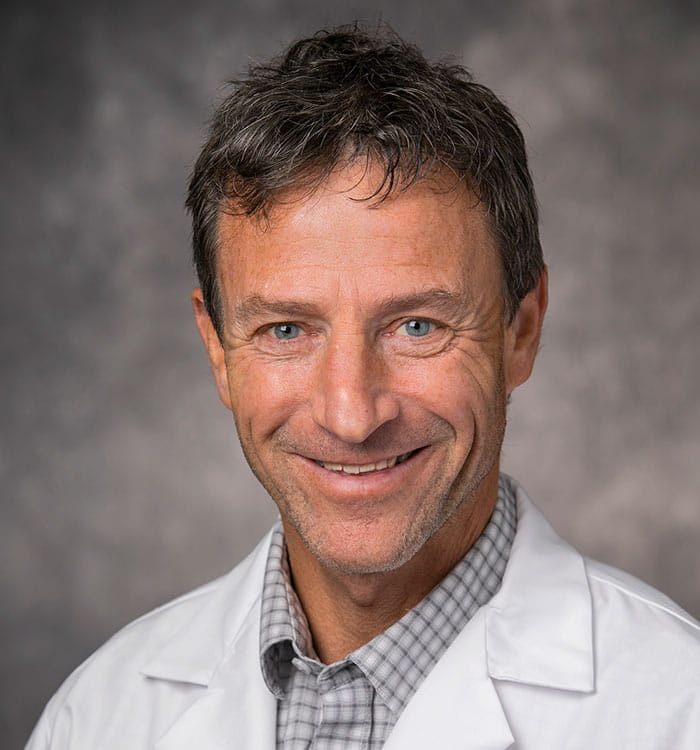University Hospitals Cleveland Medical Center Palliative Care Medicine Launches Innovative Communications Skills Training
March 08, 2022
Innovations in Geriatric Medicine | Winter 2022
Clinicians frequently must share difficult news with patients and their families, especially in the face of serious illness and near the end of life. These uncomfortable discussions are highly emotional and require communications skills often not taught in medical school.
 Palliative Care Communications Champions program taking place on Zoom.
Palliative Care Communications Champions program taking place on Zoom. Rab Razzak, MD
Rab Razzak, MD Ken Rosenfeld, MD
Ken Rosenfeld, MD“As physicians, our medical training includes details about procedures, physiology, medications—the tangible aspects of medicine,” says Rab Razzak, MD, Clinical Director of Palliative Care at University Hospitals. “Quite often we miss the human aspect of care. Palliative care brings the human back to the center of care.”
At UH, Dr. Razzak and his colleague, Ken Rosenfeld, MD, Section Chief of Palliative Care, saw the COVID-19 pandemic as an impetus and opportunity to address deficiencies in communication skills among providers, and that ZOOM offered a ready training ground to bridge the gap between people’s interest in communicating better and their ability to do so.
“As residency programs became more accustomed to remote learning, residents were naturally open to receiving training this way,” Dr. Rosenfeld says. “It overcame scheduling and logistical challenges and allowed us to train residents across departments.”
Conversations are medical procedures
Drs. Razzak and Rosenfeld created a three-module communications program, drawing from Vital Talk, which they consider the gold standard for healthcare communications training. They also used Ariadne Labs Serious Illness Communication (SIC) guide as a resource.
“We wondered what we could do that would be short enough to engage residents, but address many of the main points,” Dr. Razzak says. “So we created the Communications Champions Program. The three modules include discussing goals of care, emotionally aligning with patients and families, and addressing code status.”
Each Communications Champions module has three components. “First we teach communication concepts, then faculty model the desired communication skills in a role play, and, finally, participants practice what they learned and receive feedback,” Dr. Razzak says. “This experiential learning approach is better suited for adult learners.”
The Communications Champions Program. A three module training program that includes 1) discussing goals of care, 2) emotionally aligning with patients and families, and 3) addressing code status.
There’s an art to effective healthcare communications, he adds, that begins with creating a comfortable setting for patients and their families and then using learnable, nuanced communication skills to discuss goals of care and shared decision-making.
“Traditionally, clinicians go into so much detail, patients can’t see the forest for the trees, and the message gets lost,” Dr. Razzak says. “In communication training, we discuss looking at the big picture: succinctly discussing what happened and what it means for the future, then identifying what’s important and meaningful to our patients in light of the situation at hand.”
These deliberate conversations are appropriate for any patient facing serious illness, whether it involves a high mortality risk, bothersome symptoms and quality of life impairments, or overwhelming caregiver burden. UH now incorporates Communication Champions training into the curriculum of nearly a dozen of its residency and fellowship training programs.
Putting the heart back in healthcare
“Everyone assumes doctors come to their practice with a set of communications skills because we talk with patients all the time,” Dr. Rosenfeld says. “However, those skills don’t necessarily carry over to having difficult, emotionally ridden discussions about care at the end of life. The skills involved in conducting these conversations well are like any medical procedure. We need a specific set of skills, and we must practice our ability to perform them. If it’s not done well, it can lead to serious complications, and patients receive unwanted, burdensome and ineffective care near the end of their lives.”
A study published in JAMA Internal Medicine reports that patients who discuss end-of-life care with their clinicians, especially earlier in the disease trajectory, are more likely to have positive outcomes, including better quality of life, less distress and a higher likelihood of receiving care consistent with their preferences.
“In the process of navigating difficult decisions with patients and families, we maintain and strengthen our relationships with them,” Dr. Rosenfeld says. “It’s a key part of our success. And by addressing the difficult emotions involved, we maintain a strong sense that providers within UH are on the same team as patients and their families.”
Bringing back the joy in medicine
“We can always improve the level of care we provide,” Dr. Razzak says. “It just takes practice. Furthermore, there is a lot of burnout in healthcare. We’re hoping this training is part of the antidote to burnout. When physicians can communicate better with their patients, it brings satisfaction back in connecting with patients, and it brings back the joy in medicine.”
For more information about the UH Communication Champion Program, contact Rab Razzak at Rab.Razzak@UHhospitals.org | 216-249-6340 or Kenneth Rosenfeld, MD at Kenneth.Rosenfeld@UHhopsitals.org | 440-940-2267.
Contributing Experts:
Rab Razzak, MD
Hospice and Palliative Medicine
University Hospitals Cleveland Medical Center
Clinical Assistant Professor
Case Western Reserve University School of Medicine
Ken Rosenfeld, MD
Section Chief, Palliative Care
University Hospitals Cleveland Medical Center
Senior Clinical Instructor
Case Western Reserve University School of Medicine


